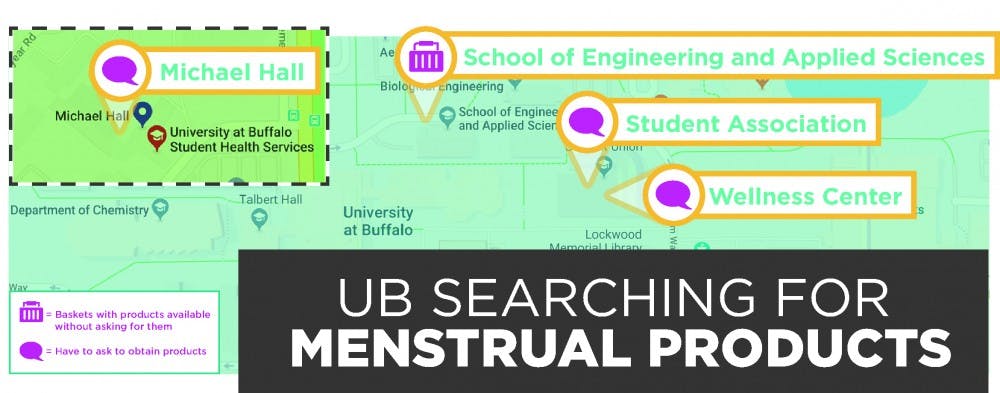UB students, faculty and staff don’t have enough access to on-campus menstrual products.
Products like tampons and pads are accessible in some off-campus public restrooms for purchase through a vending dispenser. These vending dispensers are seen in some UB restrooms, but are no longer in use.
The vending dispensers haven’t been filled for over a decade, according to Michael Walker, director of campus custodial services. Walker said he could not provide the exact year the university stopped the service, but has never supplied products for the dispensers in his 13 years at UB.
The university stopped offering the service due to student vandalism and costs to supply products, according to Walker. He said CVS and the convenience store in the Ellicott Complex are on-campus locations where people can purchase menstrual products. The products are also available for free at Wellness Education Services, Health Services and the Student Association office.
“The cost is where it’s very prohibitive. We are a very large campus and [dispensers] can cost anywhere from $300 to $500 a piece,” Walker said. “There’s the whole process of maintaining them and buying the products, as well.”
An average box containing 18 tampons is roughly $6 at CVS. An average woman will spend $1,773 in her lifetime on buying tampons, according to The Huffington Post.
Joanna George, a freshman biological sciences major, said she feels these on-campus stores are too expensive for purchasing menstrual products.
“There aren’t that many places on campus where you can purchase [menstrual] products, and CVS is just overpriced,” George said.
In October, the SUNY Faculty Senate proposeda resolution to provide students on SUNY campuses with free menstrual products in all campus restrooms.
SUNY Faculty Senate resolutions are submitted to Chancellor Kristina M. Johnson for support, according Domenic Licata, UB Professional Staff Senate chair. Licata said UB’s Professional Staff Senate endorsed the resolution this past December.
Licata said if Johnson promotes the resolution to the campuses, the directive would identify funding sources or leave funding up to the campuses. He said the UB Professional Staff Senate has not received a statement from the chancellor as of April 7, but an update could come during the SUNY Faculty Senate meeting from April 19 to 21.
“The decision whether or not to install the dispensers in the restrooms, and how they will be paid for, is expected to be made by the president,” Licata said.
President Satish Tripathi received a report of the five resolutions last week, according to Licata. Licata said he has not yet received a response on Tripathi’s decision.
Licata said the SUNY Faculty Senate recognizes products may be needed by people who identify as male, female or genderqueer and UB would need to accommodate them in whichever facility they choose to use. He said the resolution is in line with a previous proposal for campuses to provide gender-neutral facilities.
After the resolution is presented to UB administration, it will be discussed and considered for implementation, according to university spokesperson John Della Contrada.
The resolution follows the state’s current plan to provide free menstrual products for students from grades six to 12. The measure will go into effect on July 1.
In a 2013 national study by Free The Tampon Foundation, 86 percent of women reported unexpectedly starting their period in public without proper products. More than half of these women said they didn’t have products because they forgot to carry them in their bags.
Students told The Spectrum they’ve paid 25 cents to $1 for menstrual products from dispensers. George said despite the cost, she would feel safer if there were access to products in every on-campus bathroom.
“Sometime [the products] are hard to find and I need it. If I didn’t have anything with me and I looked in the bathrooms, I would probably freak out because there [might] be none there,” George said.
In response to the lack of access to these products, students and staff have contributed their own menstrual products in a few bathrooms on campus.
The School of Engineering and Applied Sciences is the only UB academic department to provide the products in all of its restrooms. The practice started 18 months ago and is paid for by the engineering school, according to the school's dean.
“It is common in tech-sector workplaces for such products to be provided to employees, so we felt that it was in keeping with the cultural norms for our community,” Folks said.
A few engineering students said the baskets helped them in emergency situations. Marlee Shaffer said she directs her friends to the engineering buildings when they need a product.
“I feel like there’s a wide variety of places where you can find them [in the engineering buildings], and I find that really helpful because I don’t have to worry about it if something happens,” said Shaffer, a sophomore environmental engineering major.
Shaffer said she believes the practice should be incorporated throughout campus to make it convenient for students looking to use the products.
The Wellness center and Health Services are two of at least three places students can receive free menstrual products, according to Wellness Education Services.
Some students said while having these centers is helpful for getting menstrual products, they feel having them available in bathrooms would be better.
Laura Zu, a freshman biological sciences major, said having easy access to menstrual products is necessary for students.
“UB needs to have [menstrual products] in restrooms for emergencies,” Zu said. “They need to be in more common places like bathrooms –– that just makes more sense.”
Student Association President Leslie Veloz said SA addresses the need for such products by offering free menstrual products in its office. Veloz said menstrual products in all bathrooms would be ideal.
“I think having access to free [menstrual] products is important and should be a priority for the UB community,” Veloz said.
Walker acknowledged the issue, but said he hasn’t been approached by UB about any future plans as of April 6.
“I don’t have a problem with providing these things, but we obviously need to have that coordination on how that will be done,” Walker said. “I have never been approached by anybody or a UB administrator to provide [products], so I don’t know where it sits.”
Wanly Chen is an assistant features editor and can be reached at wanly.chen@ubspectrum.com and@wanly_chen.





